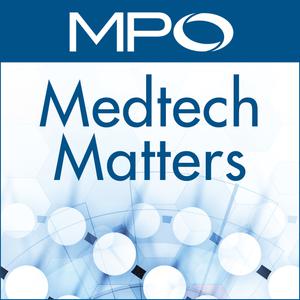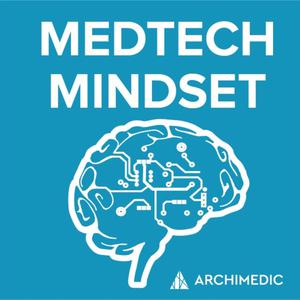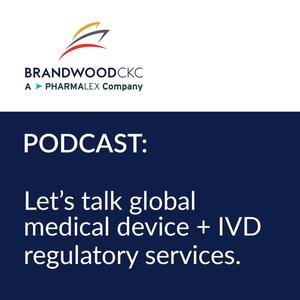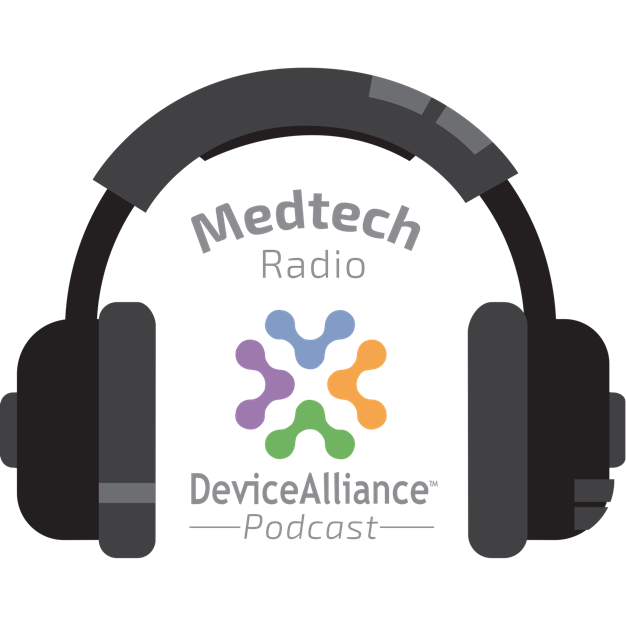
Medtech Matters
Medical Product Outsourcing
A podcast focused on the medical device technology industry, from design and development to outsourcing services and relationships to finished medtech products.
- 57 minutes 41 secondsPredetermined Change Control Plans, Part 2
In this Medtech Matters podcast episode of Mike on Medtech with Mike Drues, president of Vascular Sciences, we continue speaking on the topic of predetermined change control plans. Potential scenarios for their use are discussed, examples are provided, and role of PCCPs for manufacturing processes are explored. If you haven’t yet listened to Part 1, click here to do so. Specifically, the following questions are addressed in part 2:
- You have submitted a PCCP with a previous regulatory submission, but you have not yet made the actual, real-world change to the device. Can that PCCP submission, assuming it was approved, be used as a predicate for a 510k submission?
- For what types of devices should I consider a PCCP?
- Can you provide a few examples of PCCPs?
- Can PCCPs be used for manufacturing?
- Since the use of a PCCP is relatively new, can you think of what questions could potentially arise? What questions might we not have just yet?
- Anything else you’d like to say about the use of a PCCP we haven’t covered?
- What are the important takeaways?
After both parts, do you have a better understanding of PCCPs? If you’d like to share thoughts, ask questions, or have a suggestion for a future topic for us to cover, please reach out to me at [email protected] and we’ll see if we want to address your ideas/inquiries/suggestions in a future episode.For more medtech news and information, visit www.mpomag.com.
24 September 2024, 12:00 pm - 48 minutes 29 secondsPredetermined Change Control Plans, Part 1
In this Medtech Matters podcast episode of Mike on Medtech with Mike Drues, president of Vascular Sciences, we examine the FDA’s recent guidance documents regarding predetermined change control plans (PCCP). The first guidance addresses PCCPs for artificial intelligence (AI) and/or machine learning (ML) based devices (click here to hear an earlier podcast on this topic). The more recent guidance expands the scope to any medical device, whether it has AI/ML or not. Specifically, the following questions are addressed:
- What is a predetermined change control plan and why is it important?
- FDA published two guidances on PCCPs (one last year in April and one just this past August). These two guidances sound similar (maybe substantially equivalent), so what’s the difference?
- What’s the difference between a PCCP for a SaMD with ML or AI different from a PCCP for a non-SaMD device, like a catheter or stent?
- Are there any limits on changes in a PCCP?
- How and when do I submit a PCCP?
- What are the advantages of submitting a PCCP?
- Are there any disadvantages of submitting a PCCP?
Listen to part 2 of this discussion and then see if you have a better understanding of PCCPs. If you’d like to share thoughts, ask questions, or have a suggestion for a future topic for us to cover, please reach out to me at [email protected] and we’ll see if we want to address your ideas/inquiries/suggestions in a future episode.For more medtech news and information, visit www.mpomag.com.
24 September 2024, 11:00 am - 58 minutes 13 secondsWhat is a CAPA and How Do You Best Use It?
In this Medtech Matters podcast episode of Mike on Medtech with Mike Drues, president of Vascular Sciences, we’re focusing in on a regulatory piece that’s been mentioned numerous times with regard to other topics we’ve discussed. This episode is focused on CAPA or corrective and preventive action. We’re digging into the CAPA, what it is, its purpose, and how to best implement it. Specifically, the following questions are addressed:
- Could you please briefly highlight the reasons FDA issues 483 observations and warning letters?
- What is a CAPA and when should it be used?
- What are the most common reasons for 483s and warning letters involving a CAPA?
- How do you know if your CAPA is doing what it’s supposed to do?
- Is industry taking the wrong approach with a CAPA? Is there a better way we could be looking at this issue?
- How are CAPAs related to other aspects of the QMS, such as risk, post-market surveillance, or complaint handling?
- Do you have examples that might help illustrate what we’ve discussed?
- What else is important and/or what are the most important takeaways?
Listen to this discussion and see if you have a better understanding of CAPAs. If you’d like to share thoughts, ask questions, or have a suggestion for a future topic for us to cover, please reach out to me at [email protected] and we’ll see if we want to address your ideas/inquiries/suggestions in a future episode.For more medtech news and information, visit www.mpomag.com.
3 September 2024, 12:00 pm - 58 minutes 43 secondsYou Got a 483 from the FDA. Now what?
In this Medtech Matters podcast episode of Mike on Medtech with Mike Drues, president of Vascular Sciences, we’re discussing what the process should be for a company once they receive a 483 or warning letter from the FDA. Best practices, first steps to take, who is responsible, and potential strategies for avoiding them are shared. Specifically, the following questions are addressed:
- Could you please explain what a 483 is and what a warning letter is? Are they the same thing?
- What are some common reasons or examples of why a company would get a 483 or warning letter?
- What are the first steps for a company that has just received a warning letter or 483?
- Who is responsible for the response to a 483 or warning letter? Does this fall to regulatory? Quality? Who really should be responsible for addressing it?
- Is it common for a company to get a warning letter or 483 for the same issue? If that happens, what then should the company do?
- What’s worse than a 483 or warning letter? Is there a higher level that really causes a concern for the company involved?
- What should be considered in terms of the PR hit as a result of a 483 or warning letter?
- Do you have suggestions with regard to preventing a 483 or warning letter?
- Anything more a company should consider and after that, please share what you consider to be the most important takeaways?
Listen to this discussion and see if you have a better handle on what to do if you get a 483 or warning letter. If you’d like to share thoughts, ask questions, or have a suggestion for a future topic for us to cover, please reach out to me at [email protected] and we’ll see if we want to address your ideas/inquiries/suggestions in a future episode.For more medtech news and information, visit www.mpomag.com.
22 August 2024, 12:00 pm - 54 minutes 3 secondsRevisiting Real-World Evidence
In this Medtech Matters podcast episode of Mike on Medtech with Mike Drues, president of Vascular Sciences, we’re revisiting real-world evidence (RWE), which is a topic that’s been getting some attention. So today, we’re going to look at what’s driving that attention and discuss the reasons behind it. We’ll also talk about how the FDA is seeking to use real-world evidence. Specifically, the following questions are addressed:
- We’ve discussed real-world evidence previously, in podcasts from 2017 and 2020, but what’s the cause for us to do so today?
- Without requiring people to go back and relisten to those previous podcasts—not that I’d object—can you please briefly explain what real-world evidence is? Could you also mention how it compares and contrasts with real-world data?
- How does real-world evidence compare to what’s deemed the gold standard—randomized clinical trials?
- Do you have any examples of how real-world evidence has been used in regulatory submissions?
- FDA has a new draft guidance around real-world evidence. What’s actually new in this?
- In your estimation, what are the limitations of the new guidance? Is it falling short of what its goal should be or is supposed to be?
- Does the real-world data or evidence need to come from use within the U.S.?
- In discussing the possibility of doing this topic, you mentioned manufacturers may be missing a real opportunity with real-world evidence. What do you mean by that?
- What are the takeaways?
Listen to this discussion and see what you think of the use of real-world evidence. If you’d like to share thoughts, ask questions, or have a suggestion for a future topic for us to cover, please reach out to me at [email protected] and we’ll see if we want to address your ideas/inquiries/suggestions in a future episode.For more medtech news and information, visit www.mpomag.com.
18 June 2024, 12:00 pm - 40 minutes 42 secondsThe Most Dangerous Devices to Hit the Market
In this Medtech Matters podcast episode of Mike on Medtech with Mike Drues, president of Vascular Sciences, we’re taking a look at several devices that unfortunately ended up being quite dangerous even though they made it to the market and were used by healthcare professionals. Some of these may have been brought up previously the Netflix documentary, The Bleeding Edge, was discussed but others are new. Specifically, the following questions are addressed:
- First Mike, can you provide a definition of what a dangerous device is?
- As I mentioned in the introduction, we previously discussed the 2018 documentary The Bleeding Edge, which featured some dangerous devices. How far back do dangerous devices go though? Are these a relatively newer problem?
- Another publisher’s website featured a slideshow of four dangerous devices. But do you have any sort of idea of how many others there may have been?
- With all the regulations in place, regulatory professionals that work in this industry, and FDA oversight, how do any “dangerous devices” make it to the market?
- Should we be adding regulations to address these devices so they don’t happen again?
- What are the takeaways?
Listen to this discussion and see what you think of the system we have to attempt to prevent these types of devices from getting to market. If you’d like to share thoughts, ask questions, or have a suggestion for a future topic for us to cover, please reach out to me at [email protected] and we’ll see if we want to address your ideas/inquiries/suggestions in a future episode.For more medtech news and information, visit www.mpomag.com.
11 June 2024, 1:00 pm - 49 minutes 16 secondsHeadline-Generating Medical Device Safety Concerns
In this Medtech Matters podcast episode of Mike on Medtech with Mike Drues, president of Vascular Sciences, we’re reviewing a few stories in the news that tie into the safety of medical devices. First, a story regarding plastic syringes made in China that were deemed not to be used by the FDA. The other story is about a report indicating third-party testing lab data may be unreliable and, in some cases, falsified. Specifically, the following questions are addressed:
- Can you give some additional insights into each of these news items and explain how they are connected?
- Given the medtech universe and all the different types of devices it encompasses, a syringe seems somewhat low on the list of advanced devices. What can we learn from this device?
- If a basic device like a syringe cracks or doesn’t function properly, how realistic is it that the issue is reported to the manufacturer or FDA?
- If my device includes a syringe but it’s not manufactured by one of the companies that received a warning letter (or maybe it’s not even made in China), do I have anything to worry about?
- Do you have an example to help illustrate this?
- Looking beyond syringes, obviously virtually all device manufacturers rely on testing data. If the FDA is warning makers about third-party labs providing fabricated, duplicated, or otherwise unreliable data, what should companies do who use third-party testing labs?
- What are the takeaways?
Listen to this discussion and see what you think of these concerns regarding device safety. If you’d like to share thoughts, ask questions, or have a suggestion for a future topic for us to cover, please reach out to me at [email protected] and we’ll see if we want to address your ideas/inquiries/suggestions in a future episode.For more medtech news and information, visit www.mpomag.com.
2 May 2024, 12:00 pm - 51 minutes 35 secondsAnalyzing ECRI’s 2024 Top 10 Health Technology Hazards
In this Medtech Matters podcast episode of Mike on Medtech with Mike Drues, president of Vascular Sciences, we’re looking at the latest annual list put out by ECRI, an independent authority on healthcare technology and safety, on their top 10 health technology hazards for 2024. The full list is available at the organization’s website, which is at www.ecri.org. Specifically, the following questions are addressed:
- What is ECRI and what is the purpose of this list?
- Number one on the list is medical devices for the home. Specifically, they indicate medical devices may pose usability challenges for home users, risking misuse and patient harm. Can you please explain why this would be number one on the list? What’s the issue with usability?
- The second item on the list involves inadequate or onerous device cleaning instructions. So this isn’t really about cleaning protocols, but rather the instructions that indicate how the device should be cleaned. What’s the concern here?
- The fourth item is regarding the sustainability trend. Specifically, ECRI states this one as overlooked environmental impacts of patient care endanger public health. This is more of a product design issue, correct?
- Another hot topic item, number five calls out insufficient governance of AI used in medical technologies risks inappropriate care decisions. Is this indicating we should avoid relying too heavily on decisions indicated by AI and ensure clinician overview of findings?
- Still another hot button, cybersecurity issues ranks at number six on the list. Specifically, it is listed as ransomware targeting the healthcare sector remains a critical threat. This ties in directly to the significant efforts being put forth to ensure connected devices have a cybersecurity plan in place, correct?
- What are the takeaways?
Listen to this discussion and see what you think of these items on the list or what was missed and should have been on the list. If you’d like to share thoughts, ask questions, or have a suggestion for a future topic for us to cover, please reach out to me at [email protected] and we’ll see if we want to address your ideas/inquiries/suggestions in a future episode.For more medtech news and information, visit www.mpomag.com.
19 March 2024, 12:00 pm - 51 minutes 11 secondsExamining Institutional Review Boards
In this Medtech Matters podcast episode of Mike on Medtech with Mike Drues, president of Vascular Sciences, we’re looking at IRBs, or institutional review boards. We’re taking a look at what these are, how they relate to medical device approvals, and why they are important. Specifically, the following questions are addressed:
- Could you please explain what an IRB or institutional review board is?
- If I’m a device maker and am looking to conduct a clinical trial for one of my devices, do I need IRB approval?
- Are there situations in which I would not need an IRB approval prior to a clinical trial?
- Do you have suggestions on selecting an IRB? What I would want to look for and perhaps what I’d want to avoid?
- What information do I need to provide to the IRB for its review?
- What kind of timeline should I expect with the IRB review process?
- Do I have any recourse if the IRB review comes back not in my favor?
- What are the takeaways?
Listen to this discussion and see if you’ve gained insight for your next interaction with an IRB. If you’d like to share thoughts, ask questions, or have a suggestion for a future topic for us to cover, please reach out to me at [email protected] and we’ll see if we want to address your ideas/inquiries/suggestions in a future episode.For more medtech news and information, visit www.mpomag.com.
6 March 2024, 4:00 pm - 51 minutes 18 secondsReimbursing Breakthrough Designation Products
In this Medtech Matters podcast episode of Mike on Medtech with Mike Drues, president of Vascular Sciences, we examine the journey that’s occurred with regard to getting reimbursement tied to the FDA’s Breakthrough Designation Program (BDP). It’s been planned, called off by CMS, put into proposed legislation, but we still don’t have a definitive solution. Specifically, the following questions are addressed:
- Can you please explain what the Breakthrough Device Designation program is?
- When did the reimbursement component come into play with regard to the BDP?
- Why is it important for a BDP device to have reimbursement tied to it upon regulatory approval/clearance?
- What concerns did CMS have regarding the reimbursement portion of the BDP?
- This year, we’ve seen proposed legislation from Congress to force CMS to pay for devices that gain the BDP designation. What’s going on with these?
- Does the ridiculously low number of devices associated with the TCET demonstrate an underlying problem with all of this?
- What about the proposed “reasonable and necessary” caveat that’s also associated with the TCET? Do we need to clarify what this means or just replace it entirely?
- What are the takeaways?
Listen to this discussion and see how you feel about the latest proposed reimbursement plan. If you’d like to share thoughts, ask questions, or have a suggestion for a future topic for us to cover, please reach out to me at [email protected] and we’ll see if we want to address your ideas/inquiries/suggestions in a future episode.For more medtech news and information, visit www.mpomag.com.
2 January 2024, 1:00 pm - 38 minutes 6 secondsStrengthening the 510k Program
In this Medtech Matters podcast episode of Mike on Medtech with Mike Drues, president of Vascular Sciences, we take a look at guidances published by FDA regarding the 510k regulatory pathway. The subject matter of the three were: best practices for selecting a predicate device, the need for clinical data in a submission, and evidentiary expectations with implanted devices. Specifically, the following questions are addressed:
- Can you please provide a brief explanation of the 510k pathway?
- Why is the agency attempting to strengthen the program? What is their ultimate goal?
- With the predicate device, we recently had a podcast on using a recalled device for a predicate. When they say “best practices,” are they suggesting avoiding doing that?
- What other best practices are tied to the predicate device selection?
- How do you gather clinical data on a device that’s not cleared or approved and just being submitted to the FDA?
- For what situations is the agency considering clinical data in a submission and why?
- For the third guidance, can you explain what this is? What are evidentiary expectations with implanted devices?
- What do these mean to you? What will they mean to medical device manufacturers?
- What are the takeaways?
Listen to this discussion and let us know what you think of any or all of these guidances. If you’d like to share thoughts, ask questions, or have a suggestion for a future topic for us to cover, please reach out to me at [email protected] and we’ll see if we want to address your ideas/inquiries/suggestions in a future episode.For more medtech news and information, visit www.mpomag.com.
19 December 2023, 1:00 pm - More Episodes? Get the App
- http://mpomag.com
- en-us
Your feedback is valuable to us. Should you encounter any bugs, glitches, lack of functionality or other problems, please email us on [email protected] or join Moon.FM Telegram Group where you can talk directly to the dev team who are happy to answer any queries.
 MedTech Mindset
MedTech Mindset
 Let's talk pharmaceutical, global medical devices + IVD regulatory services
Let's talk pharmaceutical, global medical devices + IVD regulatory services
 MedTech True Quality Stories
MedTech True Quality Stories
 DeviceAlliance: MedTech Radio
DeviceAlliance: MedTech Radio
 Medsider: Learn from MedTech and HealthTech Experts
Medsider: Learn from MedTech and HealthTech Experts